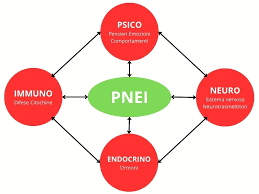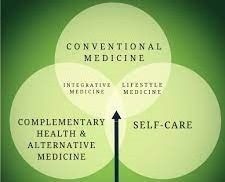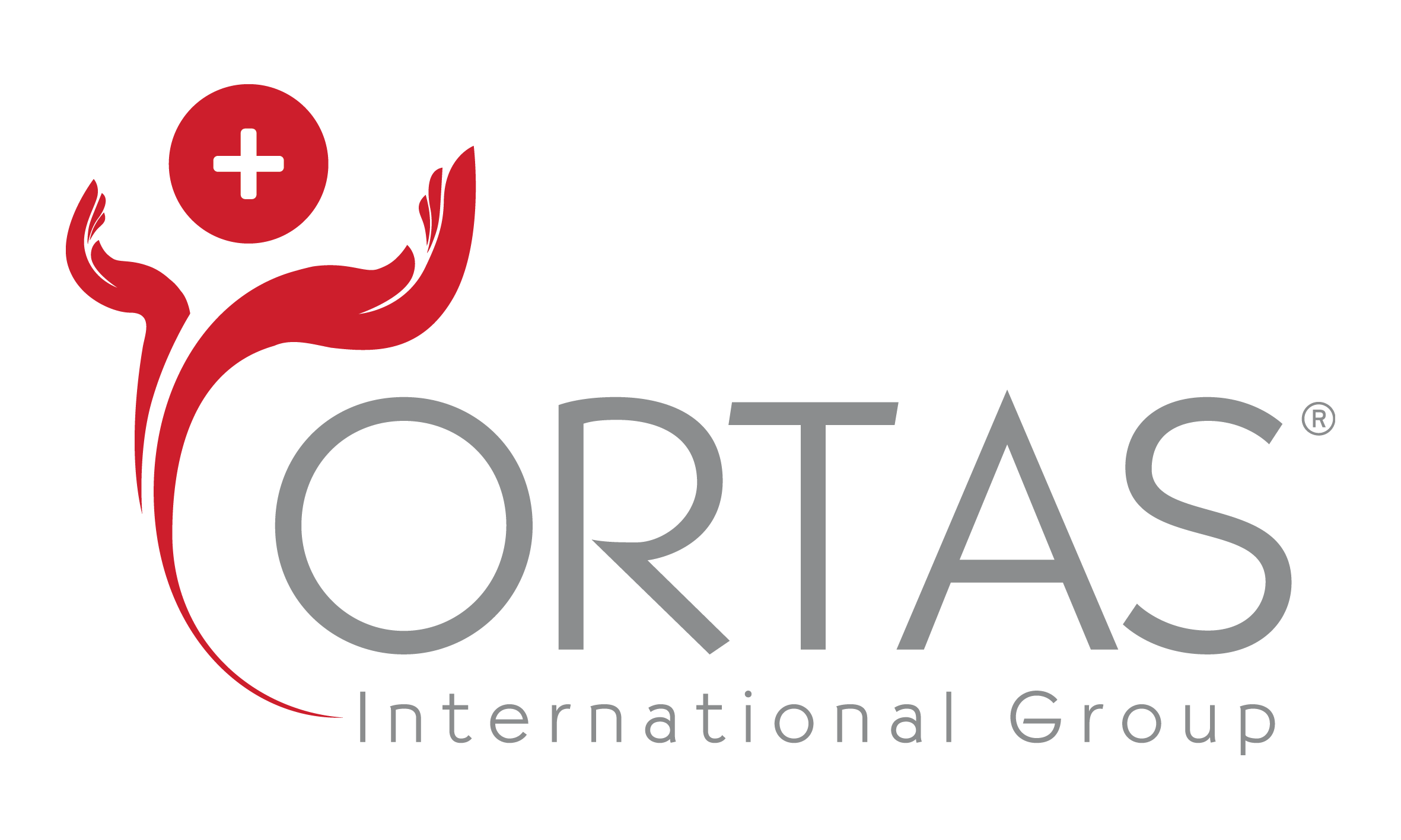OUR VISION OF MEDICIN.
The strong link between mind and body for well-being and healthThe Psycho-Neuroendocrine-Immunology (P.N.E.I.) studies confirm that the medical science must take into account the link between mind and body, understood as inseparable unity because the psychic factors influence health and course of the diseases.
In fact, several studies in the world have shown that stressful events, as severe emotional trauma, influence the Immune System and improve the development of mental, degenerative, autoimmune diseases.

Homeostatic balance.
PNEI teaches that the balanced bidirectional exchange of messages between nervous, hormonal and immune systems is necessary for the homeostatic balance and therefore for the health and well-being.
The importance of rebalancing the Immune System.
PNEI has introduced a new method of therapeutic approach aiming in the first place to reset the Immune System, which with its complex defence means (Innate Immunity, Acquired Immunity) is the primary and absolute guardian to prevent and combat infections and diseases.

THE IMPORTANCE OF INTEGRATIVE MEDICINE.
It is a therapeutic strategy to improve the individual health and well-being.Integrative Medicine combines complementary medicine with conventional treatments and takes account of the whole subject to propose an individual and personalized therapeutic strategy. The aim of integrative medicine is to promote the good quality of life and well-being.
Integrative Medicine is particularly useful for patients with chronic and degenerative diseases, where the improvement of symptoms is already a positive result for the psychological state and quality of life, including also community and environment where they live.
It is important the interaction between prescriber and patient, which must not consider a "case" of disease to be treated, but a living being with emotions and sentiments.
Homeopathic drugs and dietary supplements have been formulated with this vision of the Medicine.
OUR PRODUCTS
The homeopathics drugs and dietary supplements of
Ortas International Group
Homeopathics drugs.
The principles are bacterial lysates (Nosodes) and according to the Dynamized Micro-Immunotherapy (Julian O.A. La Materia Medica dei Nosodi. Treaty of Dynamized Microimmunotherapy. Ed. Nuova IPSA, 1996) they support the defense system to improve the homeostatic balance.
Micro-Immunotherapy of bacterial Nosodes supports the Innate Immunity and its non-specific defense activity. The bacterial souches are authorized by the European, German, French, English, American Homeopathic Pharmacopoeia.
FIND MORE OUTDietary supplements.
Dietary supplements supply the nutritional support for metabolisms altered by disease or drugs, "to improve the normal organic functions or to decrease the risk factors of disease".
(Italian Ministry of Health. Codex for the correct use of dietary supplements.2019)
find more outBibliografia
Abbas AK et al. Cellular and molecular immunology. Ed. Saunders, 2012
Akira S Innate immunity and adjuvants. Philos Trans R Soc Lond B. Biol Sci. 2011, 366: 2748-55
Akira, S et al. Pathogen recognition and innate immunity. Cell 2006, 124: 783–801
Alexander C et al. Bacterial lipopolysaccharides and innate immunity. J Endotoxin Res. 2001, 7:167-202
Alexopulos A et al. Stress-related skin disorders. Rev. Endocrine & Metabolic Desorders. 2016, 17: 295-304
Arnon DJ et al. Neuroendocrine Control of Macrophage Development and Function. Front. Immunol. 2018, 9: 1440
Barkwill FR et al. The cytokine network. Immunol Today. 1989, 10: 299-304
Bottaccioli AG et al. Stress and the psyche-brain-immune network in psychiatric diseases based on psychoneuroendocrineimmunology: A concise review. Ann NY Acad Sci Ann NY 2019, 1437: 31-42
Bulfone-Paus S et al. Mast cells as regulators of T cell responses. Front Immunol. 2015, 6: 394
Calcagni E et al. Stress system activity, innate and T helper cytokines and susceptibility to immune-related diseases. Ann NY Acad Sci 2006, 1069: 62–76
Del Rey A et al. Immune-Neuro-Endocrine Reflexes, Circuits, and Networks: Physiologic and Evolutionary Implications. Front Horm Res. 2017: 1-18
Del Rey A et al. The immune system as a sensor able to affect other homeostatic systems. Oxford University Press 2019: 5-87
Dominici G et al. Proving of Colibacillinum. Fourth International Symposium of Italian-Brazilian Homeopathy. Assergi, L’Aquila (Italy), 2011
Dominici G. Proteus vulgaris: Proving and Clinical Use in Paediatrics. Thieme Medical and Scientific Publishers Private Ltd. 2018
González SN et al. Psychoneuroimmunoendocrinology: Clinical implications. World Allergy Organ J. 2017, 10: 19
Goto Y et al. The gut microbiota and inflammatory bowel disease. Curr Opin Rheumatol 2015 27: 388–96
Grimaldi-Bensouda L et al. Management of upper respiratory tract infections by different medical practices, including homeopathy, and consumption of antibiotics in primary care: the EPI3 cohort study in France 2007-2008. PLOS One. 2014, 19: 9
Inagawa H et al. Preventative and therapeutic potential of lipopolysaccharide derived from edible Gram-negative bacteria to various diseases. Current Drug Therapy 2008, 3: 26-32
Iwasaki A et al. Regulation of adaptive immunity by the innate immune system. Science 2015, 327: 291-5
Karthic S et al. Nosodes and Sarcodes. Indian J. Traditional Knowledge 2017, 16: 158-163
Kim SJ et al. Dynamic lipopolysaccharide transfer cascade to TLR4/MD2 complex via LBP and CD14. BMB Rep. 2017, 50: 55-56
Julian OA La Materia Medica dei Nosodi. Trattato di Microimmunoterapia Dinamizzata. Ed. Nuova IPSA, 1996
Lien E et al. Toll-like receptor 4 imparts ligand-specific recognition of bacterial lipopolysaccharide. J Clin Invest. 2000, 105: 497–504
Magrone T et al. The interaction between gut microbiota and age-related changes in immune function and inflammation. Immun Ageing. 2013, 10: 31
Miller SI et al. LPS, TLR4 and infectious disease diversity. Nat Rev Microbiol. 2005, 3: 36-46
Miyake K. Innate recognition of lipopolysaccharide by CD14 and Toll-like receptor 4-MD-2: unique roles for MD-2. J Int Immunopharmacol. 2003, 3: 119-28
Nowotny A. Beneficial Effects of Endotoxins. Ed Springer US, 2013
O'Sullivan TE et al. Natural Killer Cell Memory. Immunity. 2015, 43: 634-45
Song WC. Complement and innate immunity. Immunopharmacology 2000, 49: 187–198
Steinman L. Elaborate interactions between the immune and nervous systems. Nat Immunol. 2004, 5: 575–81
Sun JC et al. NK cell development, homeostasis and function: parallels with CD8+T cells. Nature Reviews Immunology 2011, 11: 645–657
Yaribeygi H et al. The impact of stress on body function: A review. EXCLI J. 2017, 16: 1057–1072
Vieracker V. Nosode and sarcode therapies and their history: a controversial inheritance. Med Ges Gesch. 2015, 33: 155-77
